Related Research Articles
Classical liberalism is a political tradition and a branch of liberalism that advocates free market and laissez-faire economics and civil liberties under the rule of law, with special emphasis on individual autonomy, limited government, economic freedom, political freedom and freedom of speech. Classical liberalism, contrary to liberal branches like social liberalism, looks more negatively on social policies, taxation and the state involvement in the lives of individuals, and it advocates deregulation.
Libertarian socialism is an anti-authoritarian and anti-capitalist political current that emphasises self-governance and workers' self-management. It is contrasted from other forms of socialism by its rejection of state ownership and from other forms of libertarianism by its rejection of private property. Broadly defined, it includes schools of both anarchism and Marxism, as well as other tendencies that oppose the state and capitalism.

Murray Bookchin was an American social theorist, author, orator, historian, and political philosopher. Influenced by G. W. F. Hegel, Karl Marx, and Peter Kropotkin, he was a pioneer in the environmental movement. Bookchin formulated and developed the theory of social ecology and urban planning within anarchist, libertarian socialist, and ecological thought. He was the author of two dozen books covering topics in politics, philosophy, history, urban affairs, and social ecology. Among the most important were Our Synthetic Environment (1962), Post-Scarcity Anarchism (1971), The Ecology of Freedom (1982), and Urbanization Without Cities (1987). In the late 1990s, he became disenchanted with what he saw as an increasingly apolitical "lifestylism" of the contemporary anarchist movement, stopped referring to himself as an anarchist, and founded his own libertarian socialist ideology called "communalism", which seeks to reconcile and expand Marxist, syndicalist, and anarchist thought.
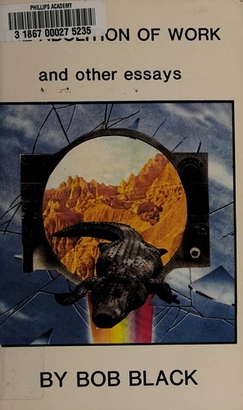
"The Abolition of Work" is an essay written by Bob Black in 1985. It was part of Black's first book, an anthology of essays entitled The Abolition of Work and Other Essays published by Loompanics Unlimited. It is an exposition of Black's "type 3 anarchism" – a blend of post-Situationist theory and individualist anarchism – focusing on a critique of the work ethic. Black draws upon certain ideas of Marshall Sahlins, Richard Borshay Lee, Charles Fourier, William Morris, and Paul Goodman.

Liberty is the state of being free within society from oppressive restrictions imposed by authority on one's way of life, behavior, or political views. The concept of liberty can have different meanings depending on context. In the Constitutional law of the United States, Ordered liberty means creating a balanced society where individuals have the freedom to act without unnecessary interference and access to opportunities and resources to pursue their goals, all within a fair legal system.
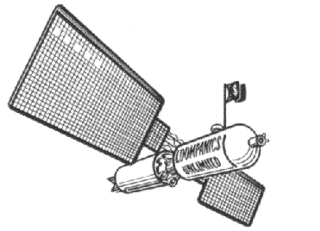
Loompanics Unlimited was an American book seller and publisher specializing in nonfiction on generally unconventional or controversial topics. The topics in their title list included drugs, weapons, survivalism, anarchism, sex, conspiracy theories, and so on. Many of their titles describe some kind of illicit or extralegal actions, such as Counterfeit I.D. Made Easy and Opium for the Masses, while others are purely informative, such as Uninhabited Ocean Islands, How to Buy Land Cheap and The Muckraker's Manual.
Paladin Press was a book publishing firm founded in 1970 by Peder Lund and Robert K. Brown. The company published non-fiction books and videos covering a wide range of specialty topics, including personal and financial freedom, survivalism and preparedness, firearms and shooting, various martial arts and self-defense, military and police tactics, investigation techniques, spying, lockpicking, sabotage, revenge, knives and knife fighting, explosives, and other "action topics". Sometimes described as the "most dangerous publisher in the world", it was sued over several murders connected to one of its books, and finally ceased operating in January 2018.
Kevin Carson is an American political writer and blogger. While he originally identified as a mutualist, he now describes himself as an anarchist without adjectives. He works as a Senior Fellow and Karl Hess Chair in Social Theory at the Center for a Stateless Society. Carson coined the pejorative term "vulgar libertarianism" to describe the use of free market rhetoric in defense of corporate capitalism and economic inequality.
Libertarianism is a political philosophy that upholds liberty as a core value. Libertarians seek to maximize autonomy and political freedom, emphasizing equality before the law and civil rights to freedom of association, freedom of speech, freedom of thought and freedom of choice. Libertarians are often skeptical of or opposed to authority, state power, warfare, militarism and nationalism, but some libertarians diverge on the scope of their opposition to existing economic and political systems. Various schools of libertarian thought offer a range of views regarding the legitimate functions of state and private power. Different categorizations have been used to distinguish various forms of Libertarianism. Scholars distinguish libertarian views on the nature of property and capital, usually along left–right or socialist–capitalist lines. Libertarians of various schools were influenced by liberal ideas.
Right-libertarianism, also known as libertarian capitalism, or right-wing libertarianism, is a libertarian political philosophy that supports capitalist property rights and defends market distribution of natural resources and private property. The term right-libertarianism is used to distinguish this class of views on the nature of property and capital from left-libertarianism, a type of libertarianism that combines self-ownership with an egalitarian approach to property and income. In contrast to socialist libertarianism, right-libertarianism supports free-market capitalism. Like most forms of libertarianism, it supports civil liberties, especially natural law, negative rights, the non-aggression principle, and a major reversal of the modern welfare state.
Anarchism is generally defined as the political philosophy which holds the state to be undesirable, unnecessary and harmful as well as opposing authority and hierarchical organization in the conduct of human relations. Proponents of anarchism, known as anarchists, advocate stateless societies based on non-hierarchical voluntary associations. While anarchism holds the state to be undesirable, unnecessary and harmful, opposition to the state is not its central or sole definition. Anarchism can entail opposing authority or hierarchy in the conduct of all human relations.
The Libertarian Enterprise is an online publication begun in October 1995 by L. Neil Smith. At the time of his death in 2021, a new issue was being posted every Sunday, however, the site's security certificate expired August 1, 2023.
Ragnar Benson is the pen name of a prolific survivalist author who specializes in preparedness topics, particularly survival retreats, hunting, trapping, austere medicine, false identification, explosives, firearms, and improvised weapons.
Liberalism is a political and moral philosophy based on the rights of the individual, liberty, consent of the governed, political equality, right to private property and equality before the law. Liberals espouse various and often mutually warring views depending on their understanding of these principles but generally support private property, market economies, individual rights, liberal democracy, secularism, rule of law, economic and political freedom, freedom of speech, freedom of the press, freedom of assembly, and freedom of religion, constitutional government and privacy rights. Liberalism is frequently cited as the dominant ideology of modern history.
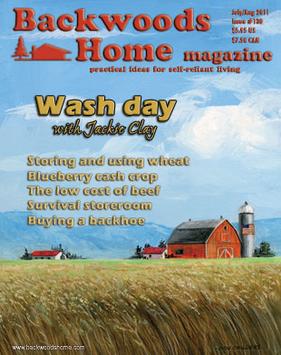
Backwoods Home Magazine is a quarterly American magazine. It was founded in 1989 in a garage in Ventura, California, by Dave Duffy and his seven-year-old daughter, Annie. After publication of the second issue, Duffy met Ilene Myers, who became his wife and partner-in-publication. Backwoods Home remains family-owned. It is based in Philomath, Oregon.
Free association, also known as free association of producers, is a relationship among individuals where there is no state, social class, hierarchy, division of labour or private ownership of means of production. Once private property is abolished, individuals are no longer deprived of access to means of production, thus enabling them to freely associate without social constraint to produce and reproduce their own conditions of existence and fulfill their individual and creative needs and desires. The term is used by anarchists and Marxists and is often considered a defining feature of a fully developed communist society.
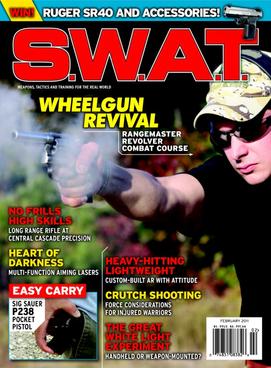
SWAT is a monthly magazine dedicated to firearms, law enforcement and other tactical-related activities in the United States with a special focus on SWAT police officers.

Adam Aristotle Starchild, born Malcolm Willis McConahy, was a financial consultant, convicted fraudster, key figure in the "perpetual traveler" movement, and prolific author of books relating to investment, taxation, and the "offshore" world.
A classless society is a society in which no one is born into a social class like in a class society. Distinctions of wealth, income, education, culture, or social network might arise and would only be determined by individual experience and achievement in such a society. Thus, the concept posits not the absence of a social hierarchy but the uninheritability of class status. Helen Codere defines social class as a segment of the community, the members of which show a common social position in a hierarchical ranking. Codere suggest that a true class-organized society is one in which the hierarchy of prestige and social status is divisible into groups. Each group with its own social, economic, attitudinal and cultural characteristics, and each having differential degrees of power in community decision.
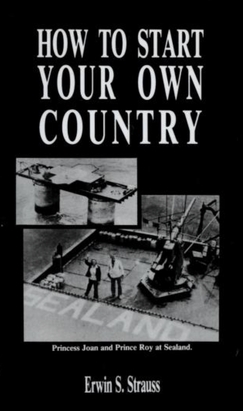
How to Start Your Own Country is an American non-fiction book written by Erwin S. Strauss about micronationalism, particularly its application to libertarianism and individualism. Strauss, who holds libertarian views, believes in the abolition of the power of the state. In How to Start Your Own Country, Strauss introduces five approaches that micronations may take in an attempt to achieve statehood, and documents various micronations and their mostly unsuccessful attempts at seceding. The first book published about micronations, How to Start Your Own Country was published in 1979, with subsequent editions in 1984 by Loompanics and in 1999 by Paladin Press. The book was well-received by critics.
References
- ↑ Wolfe, Claire (4 May 2004). "Heading for Hardyville Gulch". Archived from the original on 14 July 2017. Retrieved 15 May 2017.
...The original gulch – Galt's Gulch was Ayn Rand's creation in Atlas Shrugged....
- ↑ "Would You Move - Liberty in Our Lifetime". Archived from the original on 2012-08-01. Retrieved 2008-11-02.
- ↑ Innocents Betrayed : A Documentary Film; 2003; 58 minutes; Director: Aaron Zelman; Writer: Claire Wolfe; JPFO Productions.